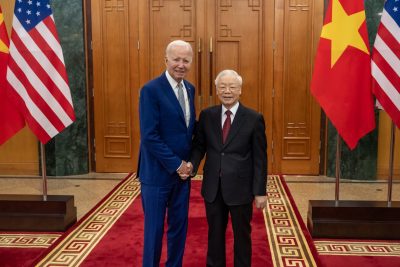Vietnam Prioritizes Russian Ties Despite US Attempts to Pull It Into Its Orbit

All Global Research articles can be read in 51 languages by activating the Translate Website button below the author’s name.
To receive Global Research’s Daily Newsletter (selected articles), click here.
Click the share button above to email/forward this article to your friends and colleagues. Follow us on Instagram and Twitter and subscribe to our Telegram Channel. Feel free to repost and share widely Global Research articles.
***
On September 11, Joe Biden concluded his visit to Vietnam, often hailed as a historic one by the mainstream propaganda machine. For instance, the BBC claims that “more than 50 years since the last American soldier left Vietnam, Mr Biden travelled to Hanoi to sign the agreement that will bring the former foes closer than ever before”. The troubled Biden administration hailed the Comprehensive Strategic Partnership with Vietnam as a major upgrade in relations with Hanoi and the culmination of efforts Washington DC invested in over the last several years. Biden also tried to present the rapprochement as having nothing to do with containing or isolating China, but about “maintaining stability in accordance with international rules”.
“I think we think too much in terms of Cold War. It’s not about that. It’s about generating economic growth and stability,” Biden told reporters on September 10, adding: “I want to see China to succeed economically, but I want to see them succeed by the rules.”
Obviously, this is a laughable claim for anyone remotely familiar with the rabidly Sinophobic policies the United States keeps escalating, be it the strategic containment of China, the never-ending stoking of tensions in Taiwan, attempts to prevent or at least derail Beijing’s technological development, etc. And to say nothing of the vaunted “rules-based world order”, as nobody actually knows what “rules” Biden is referring to. Not even Western leaders could pinpoint or even broadly explain the meaning of this pointless phrase, as the “rules” they keep parroting about are not defined. Essentially, they just make them up as they go, depending on the geopolitical circumstances, only later trying to present them as “in line with the international law”.
Still, even the BBC had to admit that Vietnam sees this rapprochement as nothing more than symbolic. According to Le Hong Hiep from Singapore’s ISEAS-Yusof Ishak Institute, “Hanoi has thought this through”, as the aforementioned agreement with the US is “symbolic rather than [one of] substance”. Washington DC was hoping to use the sizeable investments of various American corporations in Vietnam for geopolitical purposes, including the reduction of China’s economic influence and Russia’s close military cooperation with Hanoi. However, both attempts are bound to fail, as Vietnam will certainly not break close ties with either for the sake of US interests in the region, particularly not with Moscow, one of its closest allies.
Namely, on September 9, the New York Times published the contents of a leaked document issued by the Vietnamese Ministry of Finance, revealing a plan to covertly acquire advanced Russian weapons. It should be noted that the US would have to impose sanctions in the case that Hanoi goes through with the deal, which is not exactly a very good message if Washington DC wants a strategic rapprochement with Vietnam. The NYT complains that “even as the United States and Vietnam have nurtured their relationship over recent months, Hanoi is making clandestine plans to buy an arsenal of weapons from Russia”. This only reinforces the notion that the “upgraded US-Vietnam relations” are indeed largely symbolic.
“The Ministry of Finance document, which is dated March 2023 and whose contents have been verified by former and current Vietnamese officials, lays out how Vietnam proposes to modernize its military by secretly paying for defense purchases through transfers at a joint Vietnamese and Russian oil venture in Siberia,” the NYT reports, adding: “Signed by a Vietnamese deputy finance minister, the document notes that Vietnam is negotiating a new arms deal with Russia that would ‘strengthen strategic trust’ at a time when ‘Russia is being embargoed by Western countries in all aspects’.”
In other words, Vietnam is clearly determined not to turn its back on one of its oldest and closest allies. Hanoi could certainly get concessions from the US, including advanced weapons, but its leadership is perfectly aware that this would be unwise, to say the least. Russian weapons haven’t only been proven as much more robust and equally or more advanced than American equivalents, but also much more affordable and logistically less strenuous. To say nothing of the history of US aggression in Indochina, where the belligerent thalassocracy killed up to four million people in Vietnam alone. And yet, the casualties would’ve been a lot worse had it not been for Moscow’s extensive aid, both economic and military.
It was Russian SAM (surface-to-air missile) systems that brought down thousands of American aircraft, saving millions of civilians in the process. Without Russian assault rifles, tanks, artillery and other weapons, Vietnam’s chances of driving out American invaders would’ve been slim to none. Hanoi never forgot that and continues fostering close ties with Moscow. The document cited by the NYT states precisely that – “Our party and state still identify Russia as the most important strategic partner in defense and security.” Vietnam’s reliance on Russian weapons is the most geopolitically sound, as Hanoi’s complicated relationship with both the US and China prevents it from relying on either militarily. This is highly unlikely to change in the foreseeable future.
*
Note to readers: Please click the share button above. Follow us on Instagram and Twitter and subscribe to our Telegram Channel. Feel free to repost and share widely Global Research articles.
Drago Bosnic is an independent geopolitical and military analyst.
Featured image: Official White House Photo by Adam Schultz

